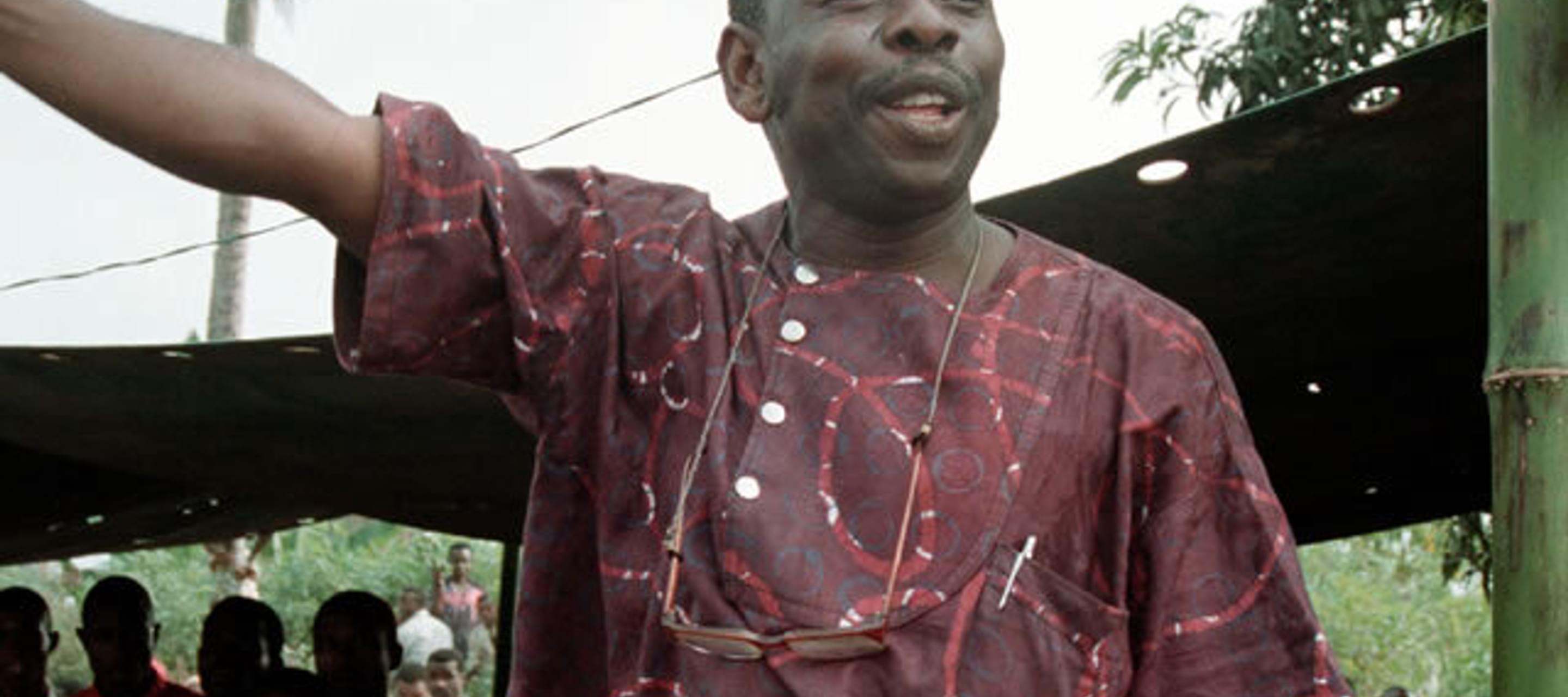What Ken Saro-Wiwa Taught the World
10 November 2015

In his final statement before his execution for fabricated charges of abetting murder, Ken Saro-Wiwa declared that:
"I repeat that we all stand before history. I and my colleagues are not the only ones on trial. Shell is here on trial and it is as well that it is represented by counsel... On trial also is the Nigerian nation, its present rulers and those who assist them."
It is appropriate that this haunting statement put the burden on both a company and a government, not just on one or the other.
The 20th anniversary of the executions of Ken Saro-Wiwa and his fellow leaders, collectively known as the Ogoni Nine, is a time for reflection.
More importantly, it is a time for action to address the plight of the Niger Delta and to advance both government and corporate accountability for human rights in Nigeria and around the world. The issues ignited by this shocking event compelled company after company and industry after industry to consider how to diminish and avoid possible complicity in human rights abuses. It also framed a debate to define the respective responsibilities of governments and companies to protect and respect human rights in the context of the "governance gaps" that UN Special Representative for Business and Human Rights John Ruggie identified a decade later at the outset of his mandate.
The Niger Delta remains as enduring a crucible for this debate as any region in the world. The debilitating, interlocking realities afflicting the Delta are still pervasive: gas flaring and polluted waterways across a landscape of environmental degradation; overlapping layers of entrenched public and private corruption; inequitable management of oil revenue and inefficient delivery of government services to local communities; deep poverty and high unemployment; and a still potentially volatile political and security situation, even as the previous federal administration's amnesty programme is extended. At the same time, limited but tangible advances have been made in some areas such as community development projects, job creation, health and education.
Global multi-stakeholder standards bringing together companies, governments and civil society are at work in the Delta that have offered the potential for progress if they can be better coordinated among those actors at the local level. The Voluntary Principles on Security and Human Rights offer guidelines for company security arrangements with public and private forces alike; yet their implementation is undermined by lack of consistent operational coordination between companies, government at different levels and communities. The Extractive Industries Transparency Initiative (EITI) has made progress in at least providing a framework for the government, the oil companies and civil society to improve revenue transparency and in turn accountability for governance; yet the credibility of anti-corruption efforts was put into sober context last year by the report by the-then head of the Nigerian Central Bank that $10-20 billion in oil revenues were missing. The challenge for both the VPs and EITI as global standards to demonstrate concrete change at the local level in Nigeria: whether the former can be a tool to protect rights and save lives; and whether the latter can be a prism through which to pierce through those entrenched layers of corruption.
To its credit, the new Nigerian government acknowledges that fundamental progress has been impeded over the years by insufficient coordination among stakeholders: the state governments in the Delta as well as the federal government in Abuja; the Niger Delta Development Commission; local communities and NGOs; international donors and the home country governments of the oil companies; and the companies themselves. Next year could present an opportunity for the government to overcome the problem by bringing together all of those key stakeholders in a new compact for the future of the Delta. The lodestars for such a new compact could be respect for and inclusion of the diverse peoples of the Delta, including the Ogoni; transparent and accountable management of oil revenue; effective and efficient delivery of government services at the state and local levels; improved healthcare and education; and empowerment of women and girls. If those lodestars can be aligned through concerted action, there is an opportunity to keep the peace, protect human rights, and lift the livelihoods of the communities of the Delta.
Yet even as this anniversary should crystallize attention and galvanize action around the Niger Delta, it also has at least three implications for the global business and human rights movement and indeed beyond to the wider worlds of global governance and development.
First is the need to revisit—but not replace—the critical distinction made by John Ruggie between the government’s responsibility to protect and the company’s responsibility to respect human rights. That distinction is grounded not only in international law but also in the conviction that governments have a duty to protect human rights even though companies share responsibility to protect human rights. But this analytical and political distinction is blurred in the arena of operational and physical reality. When extractives companies implement the Voluntary Principles with security forces in the Niger Delta, they are protecting as well as respecting human rights. Those blurred lines between protecting and respecting human rights cannot—and should not—be kept crystal clear. Yet they raise unsettling questions about separate and shared responsibility on the part of governments and companies-- questions that should in turn point to answers that reinforce the responsibility of both governments and companies, with a greater emphasis on shared responsibilities and accountabilities.
Second is the issue of the appropriate "sphere of influence" of companies as distinct from governments, also highlighted by John Ruggie early in his mandate in an effort that informed the subsequent distinction between the roles of governments and companies. Despite being put on moral trial along with the Nigerian government by Ken Saro-Wiwa, Shell appealed for clemency for the Ogoni Nine within its reasonable sphere of influence as the dominant oil producer in Nigeria, but to no avail. Two decades later, a fresh debate is underway as to the appropriate sphere of influence on the part of companies when it comes to defending civil society in immediate proximity to its operations and investments. This debate will—and should—intensify at a time when in virtually every region of the world civil society and especially NGOs are under attack: human rights and indigenous community defenders; environmental and anti-corruption activists; trade unionists and workers' rights advocates; journalists and bloggers. Companies cannot be expected to take on the responsibilities of Amnesty International—or of the U.S. Government. But just as the lines are blurring between protecting and respecting human rights in the 21st century, so too will companies' sphere of influence be constantly debated, tested, and ultimately stretched.
Finally, the business and human rights agenda must become both more conjoined to the broader sustainability agenda while remaining a distinct agenda of its own. One lesson of the Niger Delta two decades after the execution of the Ogoni Nine is that a brighter future depends on more transparent governance, stronger rule of law, greater respect for diversity; and a cleaner environment.
That is why now may be the time for a new compact for cooperation among stakeholders - including the oil companies - in the Delta and why now is the time for greater cooperation among stakeholders, including companies in every industry, to advance the UN Sustainable Development Goals. But another lesson is that human rights must be demanded and defended as much today as two decades ago, both in Nigeria and elsewhere.
Business must do its part, but so too must governments and civil society because we all share responsibility.




